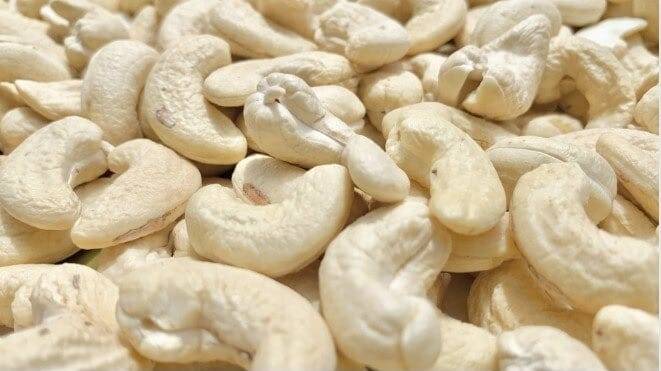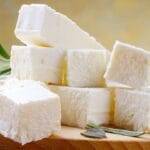Main Points In Hindi (मुख्य बातें – हिंदी में)
Here are the main points of the article summarized in Hindi:
-
काजू का क्षेत्र बढ़ाने की योजना: महाराष्ट्र काजू बोर्ड ने काजू की खेती बढ़ाने के लिए 12,000 हेक्टेयर में उच्च घनत्व और उच्च उपज वाली किस्मों के साथ काजू के पेड़ लगाने की योजना बनाई है। इस पर 3 वर्षों में 8 करोड़ रुपये की लागत आएगी, जिससे तीसरे वर्ष में लगभग 6,000 टन और चौथे वर्ष में 12,000 टन उत्पादन की उम्मीद है।
-
कृषि के नए तकनीकों को अपनाना: काजू उत्पादन बढ़ाने के लिए किसानों को नई खेती की तकनीकों से प्रशिक्षित किया जाएगा और काजू के नर्सरी को बढ़ावा दिया जाएगा, ताकि छोटे और सीमांत किसानों को लाभ हो सके।
-
प्रसंस्करण और निर्यात में सुधार: काजू के निर्यात को बढ़ाने के लिए नए काजू प्रसंस्करण संयंत्र बनाए जाएंगे और एक नई ब्रांडिंग की जाएगी। महाराष्ट्र की काजू की बिक्री ‘एक जिला एक उत्पाद’ के तहत भी की जाएगी।
-
जलवायु परिवर्तन और बीमारियों का प्रभाव: महाराष्ट्र में काजू उत्पादन जलवायु परिवर्तन और रोगों से प्रभावित हुआ है। किसानों को लाभकारी कीमतों के लिए संघर्ष करना पड़ रहा है और काजू के कच्चे माल पर निर्भरता आर्थिक परिदृश्य को प्रभावित कर रही है।
- काजू से अन्य उत्पादों का लाभ: काजू के सेब का रस निकालकर गोवा को निर्यात करने, और उससे शराब बनाने की योजना है। काजू सेब का उपयोग पशुओं के चारे के रूप में भी किया जा सकता है, और काजू के नट और सेब के रस से बेबी फीड बनाया जा सकता है, जिससे किसानों की आय में 20 प्रतिशत की वृद्धि होने की संभावना है।
Main Points In English(मुख्य बातें – अंग्रेज़ी में)
Here are the main points regarding the Maharashtra Cashew Board’s initiatives:


-
Expansion of Cashew Cultivation: The Maharashtra Cashew Board plans to increase cashew cultivation across 12,000 hectares, focusing on planting high-yielding varieties and replanting trees in declining areas, with a budget of Rs 8 crore over three years.
-
Promotion of Organic Farming: The plan includes promoting organic farming practices among cashew farmers, enhancing the number of nurseries, and introducing new farming techniques to boost production and improve farmers’ livelihoods.
-
Processing and Export Development: There will be an emphasis on creating processing and export clusters in specific districts and enhancing technological upgrades in processing plants, with a goal of increasing Maharashtra’s cashew export presence.
-
Diversification of Cashew Products: The initiative includes plans to utilize cashew apples for value-added products like juice, alcohol, and animal fodder, which can further increase farmers’ income by up to 20%.
- Addressing Challenges in Production: The cashew sector faces challenges due to climate change, diseases, and reliance on imported raw materials. The board aims to tackle these issues through scientific methods, farmer training, and improved market connections.
Complete News In Hindi(पूरी खबर – हिंदी में)
महाराष्ट्र काजू बोर्ड क्षेत्र बढ़ाने की तैयारी कर रहा है। इसके लिए काजू को अधिक से अधिक क्षेत्रों में उगाया जाएगा। जिन क्षेत्रों में इसकी खेती कम हो रही है, वहां काजू के पौधे फिर से लगाए जाएंगे। काजू बोर्ड पौधों की रोपाई की घनत्व बढ़ाने की योजना बना रहा है। इसका मतलब है कि छोटे क्षेत्रों में भी अधिक पेड़ लगाए जाएंगे। इसके साथ ही, उच्च उपज देने वाली काजू की किस्में बोई जाएंगी। इसके अलावा, किसानों को जैविक खेती के लिए भी बढ़ावा दिया जाएगा। यह जानकारी काजू बोर्ड के निदेशक परशुराम पाटिल ने दी।
पाटिल ने ‘बिजनेसलाइन’ से ऑनलाइन बातचीत में कहा, “महाराष्ट्र में 12,000 हेक्टेयर क्षेत्र में उच्च घनत्व और उच्च उपज देने वाली किस्मों के साथ काजू की खेती बढ़ाने की योजना है, जिसके लिए 3 साल में 8 करोड़ रुपये खर्च किए जाएंगे और पौधों की फिर से रोपाई की जाएगी। तीसरे वर्ष में लगभग 6,000 टन और चौथे वर्ष में 12,000 टन उत्पादन होगा। इससे आयातित कच्चे माल पर निर्भरता 25 प्रतिशत कम होगी।”
काजू की खेती बढ़ाने की तैयारी
उन्होंने कहा कि उत्पादन बढ़ाने के लिए काजू नर्सरियों को बढ़ावा देकर पौधों की संख्या बढ़ाई जाएगी, नई खेती की तकनीकों का इस्तेमाल होगा, किसानों को क्षेत्र बढ़ाने की ट्रेनिंग दी जाएगी और छोटे एवं सीमांत किसानों को किसान उत्पादक संगठनों से जोड़ा जाएगा, ताकि उनकी आय बढ़ सके और उनकी आजीविका सुनिश्चित की जा सके।
बोर्ड का ध्यान काजू उत्पादन बढ़ाने के लिए शोध पर होगा ताकि कृषि के वैज्ञानिक तरीके विकसित किए जा सकें। इस नई विधि से किसानों की आय में वृद्धि होगी, जैविक काजू उत्पादन को बढ़ावा मिलेगा, प्रसंस्करण और निर्यात को तेजी मिलेगी, देश में नए बाजारों का विस्तार होगा और नए काजू प्रसंस्करण संयंत्र बनाए जाएंगे।
पाटिल ने कहा कि इससे महाराष्ट्र से काजू के नट्स का एक नया ब्रांड बनेगा। फिर इसका निर्यात बढ़ावा दिया जाएगा। इस प्रक्रिया में अफ्रीकी देशों के साथ संपर्क बढ़ाया जाएगा ताकि महाराष्ट्र से कच्चे माल की आपूर्ति की जा सके। इसके साथ ही, महाराष्ट्र का काजू ‘एक जिला एक उत्पाद’ के तहत भी मार्केट किया जा सकेगा।
महाराष्ट्र में अधिक उत्पादन
महाराष्ट्र, काजू के व्यापार में अग्रणी राज्य है, जो देश के कुल उत्पादन का एक चौथाई हिस्सा देता है। यहां 274 मध्यम और 320 छोटे कारखाने हैं। पाटिल, जो महाराष्ट्र इंस्टीट्यूट फ़ॉर ट्रांसफॉर्मेशन में कृषि के वरिष्ठ सलाहकार हैं, ने कहा कि सरकार राज्य को प्रमुख उत्पादक बनाने की योजना बना रही है। हालांकि काजू के उत्पादन में महाराष्ट्र पहले स्थान पर है, लेकिन निर्यात में यह सातवें स्थान पर है और कच्चे काजू के सबसे बड़े आयातक हैं। उन्होंने कहा, “राज्य में लगभग 2 लाख किसान काजू की खेती कर रहे हैं, जिससे ग्रामीण क्षेत्रों में कई रोजगार के अवसर पैदा हो रहे हैं।”
महाराष्ट्र में काजू उत्पादन जलवायु परिवर्तन और बीमारियों से प्रभावित हुआ है। इसके कारण किसानों को संतोषजनक कीमतें प्राप्त करने में कठिनाई हो रही है। प्रसंस्करण क्षेत्रों में आयातित काजू कच्चे माल पर निर्भरता आर्थिक दृष्टि से समस्या उत्पन्न करती है। महाराष्ट्र में प्रसंस्करण के लिए बड़े संयंत्र बहुत कम हैं, जो ज्यादातर कुटीर स्तर पर हैं। पाटिल ने कहा कि इन संयंत्रों में नई तकनीक लागू नहीं की गई है और मशीनें भी उन्नत नहीं की गई हैं। इस वजह से उत्पादन बढ़ाने में कठिनाई हो रही है।
प्रसंस्करण संयंत्र पर जोर
कुल्हापुर, सिंधुदुर्ग और रत्नागिरी जिलों में काजू के प्रसंस्करण और निर्यात क्लस्टर विकसित करने की आवश्यकता पर जोर दिया जा रहा है। पाटिल ने यह मांग उठाई कि कच्चे काजू के आयात की अनुमति जेटीसी रत्नागिरी बंदरगाह पर दी जानी चाहिए, जहां काजू के कर्नेल का निर्यात भी संभव हो। उन्होंने कहा कि एपीईडीए को काजू के निर्यात को बड़े पैमाने पर बढ़ावा देना चाहिए। उन्होंने कहा कि महाराष्ट्र काजू बोर्ड काजू मूल्य अंतर योजना को लागू कर रहा है और हजारों किसानों को इसका लाभ मिला है। उन्होंने कहा कि सिंधुदुर्ग, रत्नागिरी और कुल्हापुर जिलों में प्राकृतिक और जैविक काजू की खेती के अच्छे संभावनाएं हैं।
इसके अलावा, काजू सेब का उपयोग बढ़ाने की योजना है। पाटिल ने कहा कि काजू सेब का रस निकाला जाएगा और गोवा में निर्यात किया जाएगा। फिर इससे शराब बनायी जाएगी। काजू सेब का रस पोषण के लिए गांवों में वितरित किया जा सकता है। काजू सेब की छाल का इस्तेमाल पशुओं के चारे के रूप में किया जा सकता है। काजू के नट्स और सेब के रस से बच्चों का भोजन तैयार किया जा सकता है। काजू सेब की शराब बना कर किसानों की आय 20 प्रतिशत बढ़ाई जा सकती है।
Complete News In English(पूरी खबर – अंग्रेज़ी में)
Maharashtra Cashew Board is preparing to increase the area. For this, cashew will be cultivated in more and more areas. Even in areas where its cultivation is declining, cashew plants will be replanted. Cashew Board is preparing to increase the density of planting of plants. This means that more trees should be planted even in less area. High yielding varieties of cashew will be planted. Apart from this, farmers will be promoted for organic farming of cashew. This information was given by Cashew Board Director Parsharam Patil.
Patil told ‘BusinessLine’ in an online conversation, “It is proposed to increase the area of cashew with high density and high yielding varieties on 12,000 hectares at a cost of Rs 8 crore over a period of 3 years in Maharashtra and replant the plants. This will yield approximately 6,000 tonnes in the third year and 12,000 tonnes in the fourth year. Dependence on imported raw materials will be reduced by 25 percent.”
Preparation to increase cashew cultivation
He said that to increase production, the number of plants will be increased by promoting cashew nurseries, new farming techniques will be used, farmers will be trained to increase the area and contact of small and marginal farmers with farmer producer organizations will be increased. So that their earnings can increase and their livelihood can be arranged.
Also read: Cashew Farming: Grow cashew in a pot on the terrace, you will get this much yield from just one plant.
The board will focus on research to increase the production of cashew so that scientific methods of farming can be devised. The income of farmers practicing this new method will increase, organic cashew production will be promoted, processing and export will accelerate, new markets within the country will expand and new cashew processing plants will be built.
Patil said that this will create a new brand of cashew nuts from Maharashtra. Then its export will be promoted. In this, contacts with African countries will be increased so that raw materials from Maharashtra can be supplied to those countries. Along with this, cashew from Maharashtra can also be marketed under ‘One District One Product’.
More production in Maharashtra
Maharashtra, the leading state in cashew business, accounts for one-fourth of the country’s total production where there are 274 medium and 320 small factories. Patil, senior advisor on agriculture at the Maharashtra Institute for Transformation, said the government plans to make the state a major producer. Despite being at the top position in growing cashew nuts, it is at seventh place in exports and is the largest importer of raw cashew nuts. He said, “About 200,000 farmers in the state are engaged in cashew cultivation, thereby creating many employment opportunities in rural areas.”
Cashew production in Maharashtra has been affected by climate change and diseases. Due to this, farmers have to struggle to get remunerative prices. Dependence on imported cashew raw material for processing areas impacts the economy. There are very few large plants for processing in Maharashtra, which are mostly at cottage level. Patil said that new technology has not been introduced in these plants, nor has the machines been upgraded. Due to this, we have to struggle to increase production.
Emphasis on processing plant
Emphasis is being laid on the need to further develop cashew processing and export clusters in Kolhapur, Sindhudurg and Ratnagiri districts. Patil raised the demand that import of raw cashew nuts should be allowed at JSW Ratnagiri port, which should also have the facility for export of cashew kernels. He said that APEDA should promote cashew export on a large scale. He said that Maharashtra Cashew Board is implementing the Cashew Price Difference Scheme and thousands of farmers have benefited from it. He said that there are good possibilities of natural and organic cashew cultivation in Sindhudurg, Ratnagiri and Kolhapur districts.
Also read: PM Modi will launch two new hybrid varieties of cashew, farmers’ yield and profit will increase, know the features
There is also a plan to increase the use of cashew apple. Patil said that cashew apple juice will be extracted and exported to Goa. Then alcohol will be made from it. Cashew apple juice can also be used for nutrition by distributing it in villages. Cashew apple peel can be used as animal fodder. Baby feed can be made from cashew nuts and apple juice. By making cashew apple wine, farmers’ income can be increased by 20 percent.










